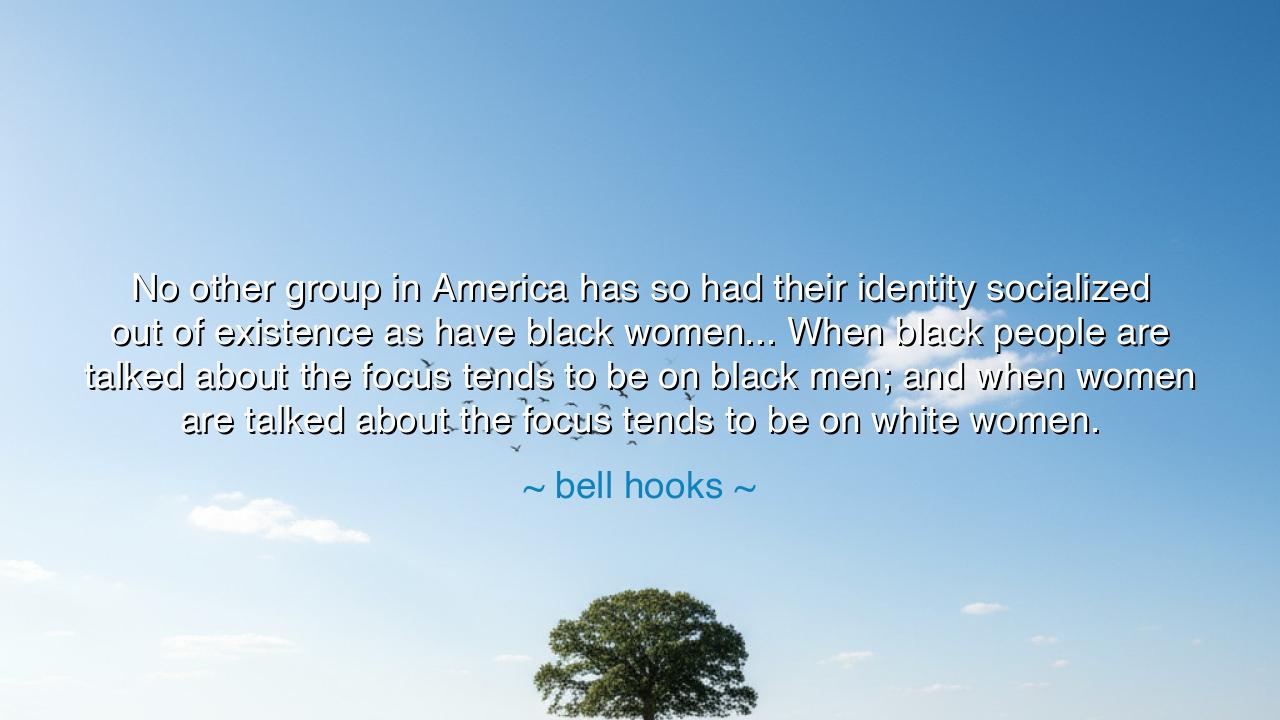
No other group in America has so had their identity socialized
No other group in America has so had their identity socialized out of existence as have black women... When black people are talked about the focus tends to be on black men; and when women are talked about the focus tends to be on white women.






Hear the fierce and sorrowful words of bell hooks, prophetess of truth and breaker of silences: “No other group in America has so had their identity socialized out of existence as have black women... When black people are talked about the focus tends to be on black men; and when women are talked about the focus tends to be on white women.” These words are not spoken lightly; they are the cry of one who has gazed into the deep wound of history and seen how a people within a people were made invisible, denied even the name of their own existence. In them lies a revelation: that black women, burdened by both the yoke of racism and the chains of sexism, were cast into a shadow where their voices went unheard, their stories untold, their labors unseen.
In the long annals of America, the struggle of the black man has rightly been told, his chains, his whippings, his marches for freedom. Likewise, the struggle of the white woman has been inscribed, her demand for the vote, her cries for equality in the halls of men. Yet in between, where these two struggles meet and intersect, stands the black woman, both woman and black, enduring double burdens, but rarely acknowledged. To speak of her was to unsettle the neat divisions of oppression. And so her identity was not celebrated, but socialized out of existence—dissolved in the tide of history’s forgetfulness.
Consider Sojourner Truth, who in 1851 stood before a gathering of women in Akron, Ohio, and thundered her immortal words: “Ain’t I a Woman?” With those four words she shattered the false veil that excluded her. For the white women spoke of their fragility, of their need for protection and chivalry, but she, born into slavery, declared that she had borne the lash, toiled the fields, and borne children torn from her arms. Was she not a woman too? Her speech resounds through the ages as a testimony that the black woman’s identity could not be erased, though society sought to render her unseen.
The wisdom of bell hooks springs from this lineage. She reminds us that erasure is not always done by chains, but also by words, by conversations that focus elsewhere, by movements that forget the whole truth. To speak only of black men when speaking of race, and only of white women when speaking of gender, is to write black women out of the human story. It is to deny their suffering, their labor, and their glory. Such denial is a violence of silence, a theft of recognition.
Yet the spirit of the black woman has not perished. From Harriet Tubman leading fugitives under the cloak of night, to Fannie Lou Hamer demanding voting rights with thunder in her voice, to Audre Lorde declaring the power of difference, the truth has risen again and again. These women carried not only the weight of their own oppression, but the survival of their people, often without acknowledgment, often without honor. Still they endured, their very existence a rebuke to the structures that tried to erase them.
The lesson is this: no people can be truly free if any part of them is cast into invisibility. To forget the black woman is to break the chain of liberation, for she is both the link of race and the link of gender. To honor her is not merely an act of justice, but a necessity for wholeness. And so we must learn to speak with fuller tongues, to see with wider eyes, to refuse to let any identity be erased by the narrowness of our language or the blindness of our movements.
Practical action must follow. Read the works of black women. Tell their stories. Support their struggles. When speaking of race, remember that gender lives within it. When speaking of gender, remember that race shapes it. In workplaces, in classrooms, in homes, ask: Whose voice is missing? Whose story has been silenced? Then give space, give platform, give honor. Let us weave black women back into the fabric of our collective story, where they have always belonged.
And so, children of tomorrow, take this wisdom from bell hooks: invisibility is the cruelest theft. Guard against it in your own age. Do not let any group be written out of existence by the careless sweep of focus. Instead, lift up those long silenced, and in doing so, make the world whole. For only when every voice is heard, and every identity honored, will the promise of freedom ring true for all.






AAdministratorAdministrator
Welcome, honored guests. Please leave a comment, we will respond soon